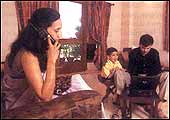













|
MANAGING
Couple-conundrum
Companies that have great faith in their
systems, and couples that insist they can keep work and life distinct
believe there's no harm in partners working for the same company.
By Mily
Chakrabarty
 |
|
SUJAY NAIK &
MANISHA KADAGATHUR, GlaxoSmithKline: different departments; so how
does it matter?
|
Ignore the common surname, Mathai-one
with a fair representation in the telephone book-and P.M. Mathai, the
General Manager, Corporate Engineering Services and Jaya Mathai, the
Senior Manager in-charge of National Medical Promotion are just two among
the 200 odd people who work in GlaxoSmithKline's Gurgaon HQ. They greet
each other when they meet in the corridors (of power), but there's nothing
to show they are friends: Jaya has her own group of office-mates; so does
P.M. Only, the two are more then friends; they're a couple.
Ajay and Anita Gupta share a surname because
they are a couple and on the day fame, in the modest guise of a possible
mention in this story, caught up with them, they weren't at work. Their
6-year old son was ill, and both parents had taken the day off to spend
time with him. Ergo, the phone at the Gupta household is ringing off the
hook. And irrespective of whether the call is for Ajay or Anita, the
person at the other end of the line always asks to speak to the other
before hanging up. These aren't well-meaning colleagues greeting their
colleague's spouse; it's work. Ajay and Anita work for the same company,
Hughes Software Systems. He is an assistant vice-president in the business
development function, and she, the director, mobile networks.
Fine, the concept of couples in the workplace
isn't new. But the attitude of companies to these 24-hour twosomes (they
live together and work together) is.
 |
|
KRITI &
SANDIP WALIA,
The Oberoi, Delhi: at work everything is purely
professional |
Couples weren't always welcome at the
workplace; in some companies, like Hindustan Lever and Electrolux, they
still aren't. There's sound, if conventional, logic behind this. ''It may
create a 'situation' in the department or the company,'' says Shantanu
Banerjee who heads the hr function at Electrolux. Agrees Manjit Singh
Lakhmana, Vice-President (Personnel), Bank of America: ''We do encourage
couples to work together but it would be awkward if they are in the same
function.''
Situation is an euphemism. What if a
manager's manager is also his spouse? Or what if X, who heads a company's
marketing department doesn't like the way y, who heads the manufacturing
department treats z, who just happens to be married to X? And what about
couples simply coming to work with loads of personal mental baggage? If
your head is spinning, you know why some companies bailed out and decided
that they would rather not have couples working for them.
Some couples too, prefer not to work for the
same company. Santosh Desai, now the executive vice-president of McCann
Erickson, and Vibha Desai, the head of O&M's Delhi office, met and got
married while at FCB Ulka (then it was just Ulka). But once they moved up,
they decided not to work for the same firm. ''It's comfortable not to work
together at the same organisation, especially at the same level,'' says
Santosh.
 |
ANITA &
AJAY GUPTA,
Hughes Software: when they move, they move together |
The recent change in attitude can be
attributed, in part, to the chronic insufficiency of talent. ''No company
would like to lose talent just because someone has got married to a
colleague,'' explains consultant Anita Ramachandran of Cerebrus
Consultant. ''(Of course), this is more prevalent in the infotech industry
where there is a (perennial) shortage of talent.'' It can be ascribed to
the belief companies have in the ability of their systems and processes
(manager-speak for how things work within organisations) to factor out
personal preferences and biases. ''We do not have any problems with
couples working for us,'' stresses Sujit Bakshi, Executive Vice-President
(HRD), HCL Technologies: ''Our appraisal system is objective, and there is
no scope for value judgement.'' And it can be credited to the faith
couples have in their capacity to keep work and life distinct. ''The
office is like a stage where we all don our professional faces; we can't
project our personal lives there,'' says Kirti Walia, an Assistant Manager
in-charge of training, at The Oberoi Centre for Learning and Development.
Her husband Sandip works as Assistant Manager (Food & Beverages) at
The Oberoi, Delhi.
P. Dwarkanath, the Head of HR at GSK, which
has four couples working for it, agrees that several things could go
wrong, but hastens to add that he and his company have never faced such a
problem. That may well be because the husband and wife pairs at gsk work
in different departments. And the high prevalence of couples in infotech
companies begs the original question: what if the firm downsizes and both
lose their jobs? Traditionalists believe all talk of professionalism and
systems is merely an excuse for a company to backtrack on its earlier
policy on couples. ''Total objectivity isn't possible when you are dealing
with your spouse,'' says Banerjee of Electrolux. The jury will likely take
some time over this one.
|

